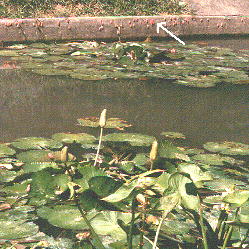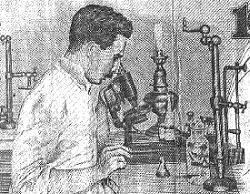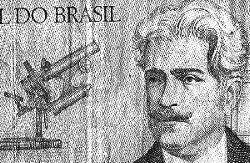'Letters from Rio' by
Roland Mortimer
(compiled by Dave Walker)
The Microscopy UK group regularly receive
emails from amateur microscopists all around the world and we are
pleased to offer the Microscopy UK Web site as a forum for people
to share their interests.
Roland Mortimer of Rio de Janeiro sent us some
interesting comments which he has kindly allowed us to reproduce
here. Why not share some of your own thoughts on any aspect of
amateur microscopy eg your particular interests, equipment,
practical tips, local haunts etc.
Please contact us (see contact at page foot) for details on how
to send material.
My local pond
 Roland
kindly sent us a snapshot of his local pond and writes 'This is
where I do all of my pond-dipping. The water contains everything,
amoeba, paramecium, diatoms etc. If you look on the far side with
a lens you'll see millions of snails eggs' (pink spots on wall,
arrowed). The snail which lays so many eggs is called Pomacea
sp. The eggs are usually rose or even purple coloured. I have
some at home and am waiting for them to hatch so I can film the
young seeing the world for the first time. The female snail can
grow to some size. I saw one which was as big as a fist. The pond
is very near our house, at night when it's warm and humid, I like
nothing better than to sit by the edge of the pond and listen to
the frogs and toads calling. If you'd like a couple more photos
of the pond and its inhabitants I'd be only too pleased to send
you some. '
Roland
kindly sent us a snapshot of his local pond and writes 'This is
where I do all of my pond-dipping. The water contains everything,
amoeba, paramecium, diatoms etc. If you look on the far side with
a lens you'll see millions of snails eggs' (pink spots on wall,
arrowed). The snail which lays so many eggs is called Pomacea
sp. The eggs are usually rose or even purple coloured. I have
some at home and am waiting for them to hatch so I can film the
young seeing the world for the first time. The female snail can
grow to some size. I saw one which was as big as a fist. The pond
is very near our house, at night when it's warm and humid, I like
nothing better than to sit by the edge of the pond and listen to
the frogs and toads calling. If you'd like a couple more photos
of the pond and its inhabitants I'd be only too pleased to send
you some. '
Microscopy on bank notes
 Microscopy on stamps seems to be attracting increasing interest.
Roland brought up the subject of microscopy depicted on banknotes
prompted by our 'Microscopy on Stamps'
article. He kindly sent two examples on old Brazilian banknotes
and one is illustrated left. He writes 'Carlos Chagas is well
known for his identification of the famous 'Chagas disease'
transmitted by the bug you can see on the note. The microscope he
is using is a Zeiss ca. 1900.'
Microscopy on stamps seems to be attracting increasing interest.
Roland brought up the subject of microscopy depicted on banknotes
prompted by our 'Microscopy on Stamps'
article. He kindly sent two examples on old Brazilian banknotes
and one is illustrated left. He writes 'Carlos Chagas is well
known for his identification of the famous 'Chagas disease'
transmitted by the bug you can see on the note. The microscope he
is using is a Zeiss ca. 1900.'
 This is
the second of the banknotes sent by Roland who writes 'Oswaldo
Cruz studied in Paris at the Pasteur Institute last century and
the famous Oswaldo Cruz Institute is shown on the reverse of the
note. Cruz is credited with developing the vaccine for yellow
fever. The Institute is here in Rio and is Brasil's research
centre for tropical diseases. I have been invited there by a
biologist.'
This is
the second of the banknotes sent by Roland who writes 'Oswaldo
Cruz studied in Paris at the Pasteur Institute last century and
the famous Oswaldo Cruz Institute is shown on the reverse of the
note. Cruz is credited with developing the vaccine for yellow
fever. The Institute is here in Rio and is Brasil's research
centre for tropical diseases. I have been invited there by a
biologist.'
Editor's note: Many thanks to Roland for sending
his letters, colour snapshots and banknotes and allowing them to
be used in Micscape.
Do you know of any media where microscopy is
illustrated which may be of interest to others eg on your own
countries banknotes, stamps (especially first day covers) etc.
Please let us know.
© Microscopy UK or their
contributors.
Please report any Web problems
or offer general comments to the Micscape Editor,
via the contact on current Micscape Index.
Micscape is the on-line monthly
magazine of the Microscopy UK web
site at Microscopy-UK
WIDTH=1
© Onview.net Ltd, Microscopy-UK, and all contributors 1995 onwards. All rights
reserved. Main site is at www.microscopy-uk.org.uk with full mirror at www.microscopy-uk.net.
 Roland
kindly sent us a snapshot of his local pond and writes 'This is
where I do all of my pond-dipping. The water contains everything,
amoeba, paramecium, diatoms etc. If you look on the far side with
a lens you'll see millions of snails eggs' (pink spots on wall,
arrowed). The snail which lays so many eggs is called Pomacea
sp. The eggs are usually rose or even purple coloured. I have
some at home and am waiting for them to hatch so I can film the
young seeing the world for the first time. The female snail can
grow to some size. I saw one which was as big as a fist. The pond
is very near our house, at night when it's warm and humid, I like
nothing better than to sit by the edge of the pond and listen to
the frogs and toads calling. If you'd like a couple more photos
of the pond and its inhabitants I'd be only too pleased to send
you some. '
Roland
kindly sent us a snapshot of his local pond and writes 'This is
where I do all of my pond-dipping. The water contains everything,
amoeba, paramecium, diatoms etc. If you look on the far side with
a lens you'll see millions of snails eggs' (pink spots on wall,
arrowed). The snail which lays so many eggs is called Pomacea
sp. The eggs are usually rose or even purple coloured. I have
some at home and am waiting for them to hatch so I can film the
young seeing the world for the first time. The female snail can
grow to some size. I saw one which was as big as a fist. The pond
is very near our house, at night when it's warm and humid, I like
nothing better than to sit by the edge of the pond and listen to
the frogs and toads calling. If you'd like a couple more photos
of the pond and its inhabitants I'd be only too pleased to send
you some. '  Microscopy on stamps seems to be attracting increasing interest.
Roland brought up the subject of microscopy depicted on banknotes
prompted by our
Microscopy on stamps seems to be attracting increasing interest.
Roland brought up the subject of microscopy depicted on banknotes
prompted by our This is
the second of the banknotes sent by Roland who writes 'Oswaldo
Cruz studied in Paris at the Pasteur Institute last century and
the famous Oswaldo Cruz Institute is shown on the reverse of the
note. Cruz is credited with developing the vaccine for yellow
fever. The Institute is here in Rio and is Brasil's research
centre for tropical diseases. I have been invited there by a
biologist.'
This is
the second of the banknotes sent by Roland who writes 'Oswaldo
Cruz studied in Paris at the Pasteur Institute last century and
the famous Oswaldo Cruz Institute is shown on the reverse of the
note. Cruz is credited with developing the vaccine for yellow
fever. The Institute is here in Rio and is Brasil's research
centre for tropical diseases. I have been invited there by a
biologist.'